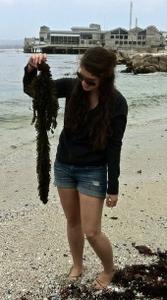ESP Biography
NICOLE SARTO, Save the whales! (& the sharks, & the turtles...)
|
Major: Earth Systems College/Employer: Stanford Year of Graduation: 2013 |

|
Brief Biographical Sketch:
Hello! I am a Senior studying earth systems, but my focus is in marine ecology and conservation because I love the ocean and everything in it! I've spent time in Australia, snorkeling on the Great Barrier Reef, and also at a tiny island in the middle of the Pacific Ocean named Palmyra (google it!) and am pretty confident that coral reefs are some of the most beautiful ecosystems on the planet. Join me in my SPLASH! class and find out what threats are facing this amazing ecosystem and what we can do about it! Past Classes(Clicking a class title will bring you to the course's section of the corresponding course catalog)P2376: Threats to Coral Reef Ecosystems in Splash! Fall 2012 (Nov. 03 - 04, 2012)
In this class, we will talk about the natural and anthropogenic threats to coral reefs including storm damage, disease outbreaks, tourism, pollution, coastal development, overfishing, ocean acidification and rising sea surface temperatures. We will also discuss possible strategies for addressing these issues.
B2018: Threats to Coral Reef Ecosystems in Splash! Spring 2012 (Apr. 21 - 22, 2012)
The ocean is in some serious trouble with climate change and rising greenhouse gas emissions, so it's really important that we do everything we can to keep the ocean healthy -- not just for the ocean's sake, but for our own! Without a healthy ocean, we are also going to be in some serious trouble. Ocean ecosystems, like coral reefs and mangrove forests, do a lot of important things. They provide food and livelihoods to people all over the world, and help protect coastal communities from storms and erosion.
In this class, we will talk about the natural and anthropogenic threats to coral reefs including storm damage, disease outbreaks, tourism, pollution, coastal development, overfishing, ocean acidification and rising sea surface temperatures. We will also discuss possible strategies for addressing these issues.
|
|
